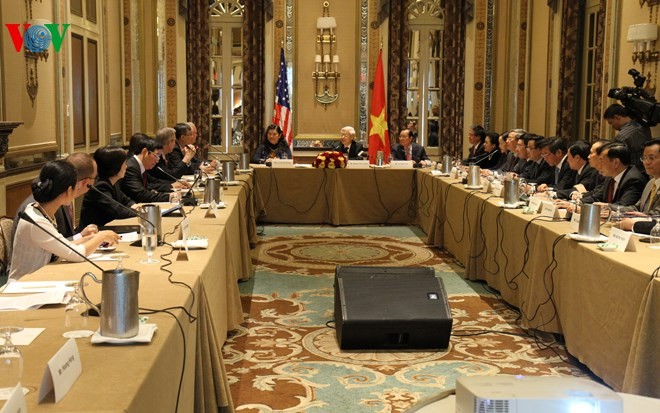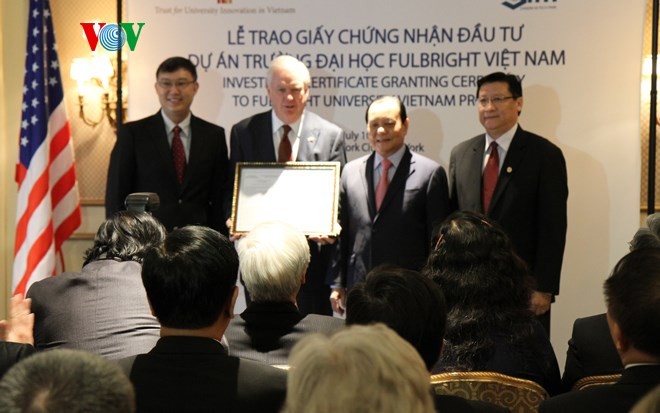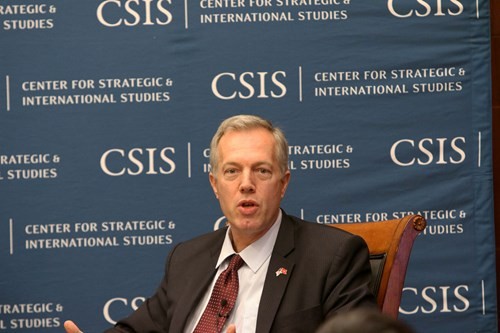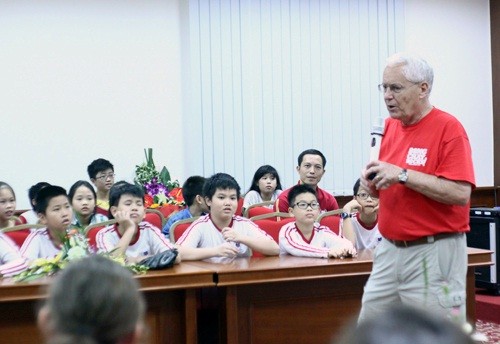(VOVworld) – Recent cooperation in education, healthcare, and humanitarian activities has greatly consolidated Vietnamese-US relations.
 |
| Party chief Nguyen Phu Trong meets Harvard’s scholars |
The young generation together with the growing educational and economic cooperation, is the bridge to repair Vietnam-US relationship.
In 1995 there were only 800 Vietnamese students studying in the US and bilateral trade reached about 400 million USD. To date, when two-way trade turnover has been 35 billion USD, the number of Vietnamese graduates in the US has risen to 17,000, leading the Southeast Asian nations and ranking 8th in the world.
The figures show that after 20 years of normalization, Vietnam-US relations have developed in all fields, and education in particular has experienced great progress.
 |
US Ambassador Ted Osius said: “I like to see a very ambitious educational cooperation including to establish a new Fulbright University in Vietnam that is not only the best university in Vietnam, but the best new university in the world. I like to see cooperation in the field of science and technology, education, and health. I think we’ll have a strong basis from working together in the last 20 years to do much more in the next 20 years.”
More than 1,100 Vietnamese Fulbright graduates have undertaken major positions in all levels and spheres in cities and provinces across the nation.
 |
| US Ambassador to Vietnam Ted Osius at the dialogue held by CSIS. |
In addition to the cooperative efforts of the two governments, both Vietnamese and US schools have proactively increased educational and training exchanges as well as cooperation programs.
 |
| Phil Rognier, who is also the Executive Director of the First Swing Foundation, a non-governmental organization dedicated to baseball training, has brought baseball to Vietnam. |
In 2013 the Vietnam International School in Hanoi’s outlying district of Duong Noi sent the first group of Vietnamese students to the US in an exchange program with the George Washington secondary school.
Nguyen Vinh Tam, the Chair of the Executive Board of Vietnam International School, said: "the program creates a good opportunity for Vietnamese and American students to get to know other better and promote solidarity. I think we should close the book on the past and look towards the future. When American and Vietnamese students understand the other’s countries and people, they will form a bridge linking the two nations”.
Healthcare is another area which has received great attention from both governments. Since Vietnam and the US normalized relations, new cooperative fields have opened including the training of medical staff, vaccine research, epidemiology, and disease prevention, particularly into HIV/AIDS.
USAID Vietnam Mission Director Joakim Parker said that over the 5 years between 2014 and 2018, the organization will spend 344 million USD on implementing support programs in various fields.
He said: “there’s a substantial work that is funded by PEPFAR in HIV/AIDS. We’ve invested a lot in helping people with HIV/AIDS and organizations to work with them and the Ministry of Health. We’re proud of our work on improving capacity of prevention of emerging disease and threat issues that look backwards. We’re very excited about that project which is huge and diverse, on track, and still on its time completion.”
With the spirit of setting aside the past and looking towards the future, many US veterans who had fought in Vietnam have now returned to heal war wounds and promote mutual understanding between the two peoples.
The US Veterans Association and Vietnam’s Military Engineering Command have carried out a project in the central provinces to review the impact of unexploded mines.
Since 2012, the USAID and the Vietnamese Defense Ministry have jointly run a project to deal with Agent Orange/dioxin residue in Da Nang airport. Head of the national steering committee to overcome the impact of toxic chemicals, Nguyen The Dong said.
He noted that “dioxin pollution in Vietnam has been a big problem. Vietnam has received efficient support from the US to tackle the issue. We have discussed further cooperation in humanitarian activities to support people with disabilities, war victims and victims of Agent Orange. The US has offered support to the handicapped through humanitarian organizations.”
40 years after the war ended, Vietnam and the US now have a new generation of dynamic youth with a fresh mindset and willingness to reform unimpeded by the past.
With joint efforts by bilateral governments, organizations and individuals, Vietnamese-US relations will progress further on the basis of comprehensive cooperation.